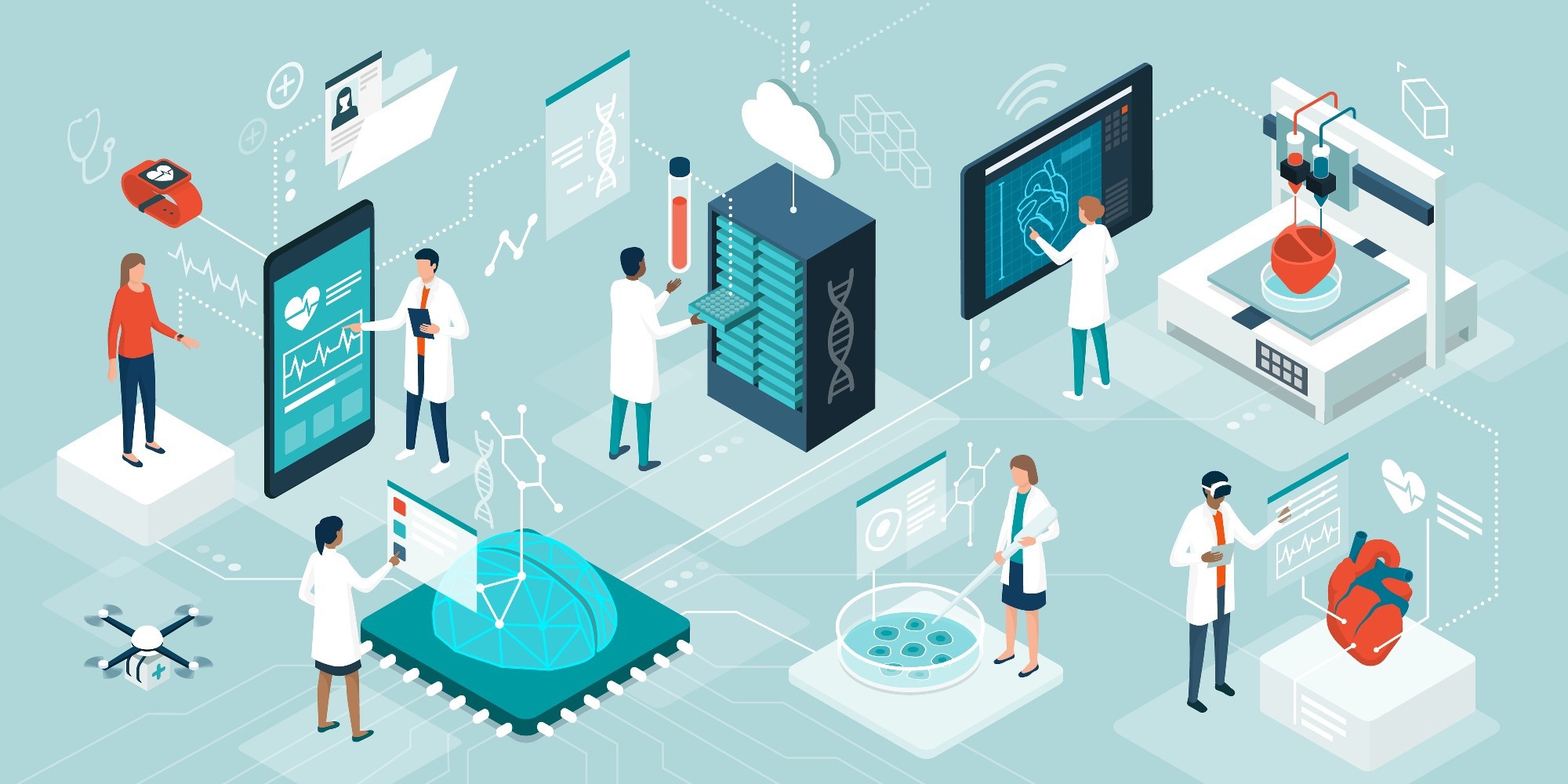As part of our SLAS Europe 2022 coverage, we speak to Professor Patricia Maguire from the University College Dublin about their AI_PREMie technology and how it can help to save mothers and babies lives.
Please could you introduce yourself and tell us what inspired your career in artificial intelligence (AI)?
My name is Patricia Maguire, and I am a professor of biochemistry at University College, Dublin (UCD). Four years ago, I was appointed director of the UCD Institute for Discovery, a major university research institute in UCD, and our focus is cultivating interdisciplinary research. In that role, I first became excited by the possibilities of integrating AI into my research.
AI has seen increased attention in recent years, especially concerning its adoption in healthcare settings. Despite this, obstacles still need to be overcome before it is commonplace within research. What do you believe to be some of the biggest challenges surrounding the adoption of AI in clinical settings?
I think there are two major obstacles to adopting AI in healthcare. The first is that when it comes to the actual deployment of that AI in a clinical setting in the real world, there is a significant gap from that lab-based tech development to getting it deployed in the clinic and operationalized there. The second is that once that AI is operationalized, the frontline staff may have difficulty adopting it. Staff are going to be really busy, and their time is valuable. We need to offer them practical solutions that give them reliable results that augments their clinical decision-making.

Image Credit: Jsnow my wolrd/Shutterstock.com
You are currently the director of the ConwaySPHERE research group at University College Dublin. Please could you tell us more about this research group and its missions?
I co-direct the UCD Conway SPHERE Research Group with my hematology colleagues, Professor Fionnuala Ní Áinle and Dr. Barry Kevane. Our mission is to understand and help diagnose inflammatory diseases, and we work together as a group of clinicians, academic staff, and scientists, collaborating both nationally and internationally.
For AI_PREMie it is a truly transdisciplinary team that we have brought together – encompassing clinicians and frontline staff from the three Dublin maternity hospitals. In doing so, we have covered 50% of all births in Ireland. We have brought these hospitals together with a host of scientists from across University College Dublin and data scientists from industry, namely the SAS Institute and Microsoft. The whole AI_PREMie team’s mission is to get this prototype test to every woman who needs it worldwide because we believe we will save lives.
You are giving a talk at SLAS Europe 2022 titled ‘AI_PREMie: saving lives of mothers and babies using AI.’ What will you be discussing in this talk, and what can people expect?
I will discuss our project AI PREMie, which brings together cutting-edge biochemical, clinical, and machine learning expertise. By bringing them together, we have developed a new prototype test for risk stratification in preeclampsia.
AI-PREMie
As demonstrated in your latest research, AI_PREMie can accurately help to diagnose preeclampsia, a serious complication affecting one in ten pregnancies. What are the benefits of accurately diagnosing preeclampsia not only for the women and their babies but also for healthcare settings?
Fifty thousand women and 500,000 babies are lost to preeclampsia every year, and an additional 5 million babies are born prematurely – sometimes very prematurely – because of preeclampsia. It is easy to see how devastating preeclampsia is as a disorder: it affects our most vulnerable in society, their whole families, and their whole communities.
If we can diagnose preeclampsia in a much timelier manner, we can deliver efficient, effective healthcare that can have a massive impact on the societal good. Not only will this allow us to prevent premature births, but we can also save lives.
What are some of the benefits of using AI tools such as AI_PREMie in diagnosis compared to current diagnostic methods?
There have been no significant advances in preeclampsia diagnosis. We are still using screening tests that were introduced decades ago. We look at high blood pressure, and we look at protein in the urine when we are screening these women, and sometimes these metrics do not predict the outcome.
There is simply no test available to tell a clinician that a woman has preeclampsia. There is also no test to predict how that preeclampsia will progress. This means there is no test to tell a clinician or a midwife when to deliver that baby. AI PREMie, our prototype test, will hopefully be able to not only diagnose preeclampsia but also predict the future in a sense and tell the clinician the best time to deliver that baby – because every day in utero for that baby counts.
Are you hopeful that with continued innovation within the artificial intelligence space, we will see more clinical practices turning to this technology to help aid healthcare? What would this mean for global health?
The field of AI is moving so fast, and healthcare is trying to keep up with it. I do see a future where our healthcare information will be available to us much like our banking information is: securely, maybe even on our mobile phones, and that way, we can move global health to treat disease to a status where we predict disease and prevent disease.

Image Credit: Chompoo Suriyo/Shutterstock.com
Do you believe that AI_PREMie could also be applied to other clinical diagnoses? What further research would need to be carried out before this could be possible?
The patented biomarkers underlying AI PREMie are derived from the information stored within the platelet of sick, pregnant women, and we have studied that information or that ‘cargo’ stored within the platelet. We know that this is a marker – a form of a barcode – of the health status of an individual. In our lab, we are currently looking at this cargo in other diseases involving inflammation and vascular dysfunction concerning the platelet. Right now, we have projects ongoing on multiple sclerosis, cancer-associated thrombosis, and also COVID-19 to look to see if we can find new biomarkers in the platelets for these diseases.
Are there any particular areas where you are excited to see AI incorporated within the life sciences sector?
We have shown in our project that incorporating AI into data-driven life sciences projects has the potential to be truly transformative. If you look at what is available now, eye diseases can be detected using neural networks of three-dimensional retinal scans, but also in critical care, there are now sepsis warnings based on AI, which has dramatically reduced the number of deaths from sepsis in these hospitals. The potential is just so exciting.

Image Credit: elenabsl/Shutterstock.com
What’s next for you and the ConwaySPHERE research group?
Next year, excitingly, we are planning to take AI PREMie across Ireland – so we want to increase the recruitment and data collection across Ireland and grow the group even more.
Where can readers find more information?
Websites:
Twitter: @maguirepatr @AIPREMie #AI_PREMie
Instagram: AI_PREMie
LinkedIn: www.linkedin.com/in/patricia-maguire-UCD
About Professor Patricia Maguire
Patricia Maguire is an interdisciplinary scientist and inventor who is passionate about the intersection of Artificial Intelligence with Biomedical Science. She is Professor of Biochemistry at University College Dublin and Director of the UCD Institute for Discovery. This institute recently launched the UCD AI Healthcare hub (AIHH), with the ambition to transform healthcare at the individual to the systemic level.
Patricia’s own research is focused on platelets and extracellular vesicles in several inflammatory diseases including preeclampsia, multiple sclerosis, arterial and venous thrombosis, cancer-associated thrombosis and covid19. She has published widely including the journals Nature Communications, Proceedings of the National Academy of the Sciences, Proteomics, and Blood.
Through her unique expertise, she has developed a bespoke diagnostics platform PALADIN (PlAteLet bAsed DIagNostics) that combines the power of platelets in blood to sense their environment with advanced omics technologies and Artificial Intelligence to uncover secrets of health and disease.
Patricia has used PALADIN to uncover patented diagnostics that can diagnose preeclampsia in sick pregnant women; the multi award-winning AI_PREMie project. She also has a pipeline of potential new disruptive diagnostics from other projects in her lab. She collaborates with industry across multiple sectors including Bayer AG, Sanofi, Mallinckrodt pharmaceuticals, Microsoft, Google and SAS.
Patricia is an advocate and mentor of women in STEM. In 2018, she won a UCD Values in Action award for her work in Equality, Diversity and Inclusion across UCD and bringing the values of creativity, collegiality, and engagement to life.
She lives in Dublin, Ireland where she is married and is (a swim) Mum to three teenage girls.

 PARENTING TIPS
PARENTING TIPS PREGNANCY
PREGNANCY BABY CARE
BABY CARE TODDLERS
TODDLERS TEENS
TEENS HEALTH CARE
HEALTH CARE ACTIVITIES & CRAFTS
ACTIVITIES & CRAFTS

